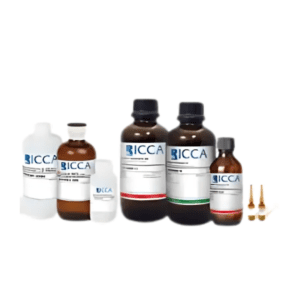Inorganic Salts
Description
General Laboratory Chemicals – Inorganic Salts: Vital for Chemical and Biological Research
Inorganic salts play a crucial role in laboratory research and industrial processes. Composed of metal cations and non-metal anions, these salts are used to create solutions, maintain ionic balance, and regulate pH levels in various chemical and biological reactions. Due to their stability, solubility, and wide range of applications, inorganic salts are indispensable in analytical procedures, preparation of reagents, buffer solutions, and nutrient media.
These salts are commonly used in biochemistry, environmental testing, pharmaceutical formulation, and industrial manufacturing. In laboratories, they are used to simulate physiological conditions, carry out titrations, and prepare solutions for chromatographic analysis. Their ability to dissociate into ions makes them important in controlling the ionic strength of a solution, which is essential for many biological and chemical experiments.
Inorganic salts are used in a variety of industries, including pharmaceuticals, water treatment, agriculture, and food production. They are used for purposes such as creating fertilizers, treating water, and manufacturing food additives. In laboratories, inorganic salts are used to prepare standard solutions, regulate pH in buffers, and maintain proper conditions for reactions to take place.
Applications of Inorganic Salts:
- Analytical Chemistry: Inorganic salts are used to create reagents and solutions for titration and other analyses.
- Biological Research: These salts are essential for maintaining the proper ionic environment for cell culture, protein studies, and enzymatic reactions.
- Environmental Testing: Used in water testing and monitoring to control the ionic strength and ensure optimal conditions.
- Pharmaceuticals: Inorganic salts are used in drug formulation and production, particularly in solutions for injections, tablets, and syrups.
- Industrial Manufacturing: Inorganic salts are employed in the production of fertilizers, water treatment, and food additives.
- Food Production: Used in the formulation of additives, preservatives, and flavor enhancers.
Comprehensive List of Products in the Inorganic Salts Category:
1. Sodium Chloride (NaCl):
- Applications: Widely used in preparing saline solutions, buffer solutions, and as a general laboratory reagent.
- Industries: Biochemistry, environmental testing, pharmaceutical, and food industries.
- Features: Soluble in water, used to maintain osmotic balance in biological studies.
2. Potassium Chloride (KCl):
- Applications: Used in electrolyte solutions, medical applications, and preparing buffer solutions.
- Industries: Pharmaceutical, clinical diagnostics, and industrial manufacturing.
- Features: Provides potassium ions essential for various biochemical reactions.
3. Calcium Chloride (CaCl2):
- Applications: Used in de-icing, water treatment, and as a reagent in laboratory solutions.
- Industries: Chemical manufacturing, water treatment, and food processing.
- Features: Highly soluble in water, used for creating calcium-rich environments in experiments.
4. Magnesium Sulfate (MgSO4):
- Applications: Used in laboratory procedures, particularly in the preparation of buffers and solutions for cellular studies.
- Industries: Biochemical research, pharmaceuticals, and agriculture.
- Features: Essential for maintaining magnesium levels in biological processes.
5. Sodium Bicarbonate (NaHCO3):
- Applications: Commonly used in buffer solutions to regulate pH, as well as in pharmaceutical applications.
- Industries: Analytical chemistry, pharmaceuticals, and environmental monitoring.
- Features: Alkaline salt used to maintain a stable pH environment in laboratory setups.
6. Potassium Phosphate (K3PO4):
- Applications: Used in biological and chemical experiments, particularly to maintain pH in buffer solutions.
- Industries: Molecular biology, biotechnology, and agricultural research.
- Features: Provides phosphate ions necessary for cellular energy processes.
7. Ammonium Chloride (NH4Cl):
- Applications: Used in preparation of acidic buffer solutions and in biological research.
- Industries: Biochemistry, molecular biology, and pharmaceuticals.
- Features: Used in buffers to regulate pH in acidic conditions.
8. Copper Sulfate (CuSO4):
- Applications: Used in analytical chemistry, as a reagent in reaction studies, and in agriculture for treating fungal infections.
- Industries: Agriculture, pharmaceutical, and environmental testing.
- Features: Provides copper ions for various reactions and processes.
9. Sodium Hydroxide (NaOH):
- Applications: Commonly used in titrations, preparation of reagents, and as a strong base for pH adjustment.
- Industries: Chemical manufacturing, environmental testing, and laboratory research.
- Features: Strong alkali used to neutralize acids and regulate pH.
10. Potassium Nitrate (KNO3):
- Applications: Used in agricultural and chemical industries, including fertilizers and manufacturing of explosives.
- Industries: Agriculture, chemical manufacturing, and food industry.
- Features: Provides essential nitrate ions for plant growth and chemical reactions.
11. Sodium Sulfate (Na2SO4):
- Applications: Used in the preparation of solutions for laboratory reactions and in the textile industry.
- Industries: Analytical chemistry, textiles, and pharmaceuticals.
- Features: Utilized for its desiccant properties and in preparing anhydrous compounds.
12. Ferric Chloride (FeCl3):
- Applications: Used in water treatment, chemical synthesis, and as a reagent in laboratory settings.
- Industries: Environmental testing, chemical manufacturing, and industrial applications.
- Features: A key compound in industrial processes, especially in water purification.
13. Barium Sulfate (BaSO4):
- Applications: Used in analytical chemistry, as a reagent for gravimetric analysis, and in radiology as a contrast agent.
- Industries: Pharmaceuticals, healthcare, and chemical manufacturing.
- Features: Insoluble in water, used in specialized diagnostic procedures.
14. Zinc Sulfate (ZnSO4):
- Applications: Used in pharmaceuticals and as a supplement in agricultural formulations.
- Industries: Agriculture, chemical synthesis, and healthcare.
- Features: Provides essential zinc ions for biological processes.
15. Lithium Carbonate (Li2CO3):
- Applications: Used in lithium-ion batteries, chemical synthesis, and as a therapeutic drug for bipolar disorder.
- Industries: Pharmaceuticals, electronics, and chemical manufacturing.
- Features: Used in various applications including drug formulation and battery production.
Conclusion:
Inorganic salts are crucial for a wide variety of laboratory and industrial applications, ensuring the stability and accuracy of experiments and processes. From Sodium Chloride for general solutions to Potassium Phosphate for biological experiments, these salts are foundational in maintaining the proper ionic balance, pH stability, and reagent preparation for chemical and biological research.





